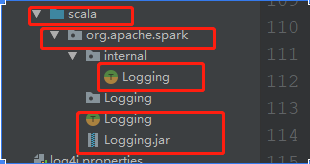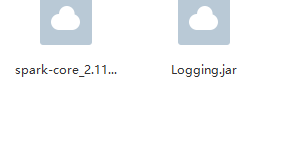
一,1 在使用spark读取kafka数据时,当spark升级到2.0之后,出现如上问题:之前遇到了,当时在工程里面添加了org.apache.spark.Logging类,能够运行。
但是在后期使用过程中,又遇到了相同的问题,为了一劳永逸,今天彻底把问题解决。
在项目下创建org.apache.spark.logging类
将源码考入类中
package org.apache.spark
import org.apache.log4j.{LogManager, PropertyConfigurator}
import org.slf4j.{Logger, LoggerFactory}
import org.slf4j.impl.StaticLoggerBinder
import org.apache.spark.annotation.DeveloperApi
import org.apache.spark.util.Utils
/**
* Created by Administrator on 2017/8/11.
*/
/**
* :: DeveloperApi ::
* Utility trait for classes that want to log data. Creates a SLF4J logger for the class and allows
* logging messages at different levels using methods that only evaluate parameters lazily if the
* log level is enabled.
*
* NOTE: DO NOT USE this class outside of Spark. It is intended as an internal utility.
* This will likely be changed or removed in future releases.
*/
@DeveloperApi
trait Logging {
// Make the log field transient so that objects with Logging can
// be serialized and used on another machine
@transient private var log_ : Logger = null
// Method to get the logger name for this object
protected def logName = {
// Ignore trailing $'s in the class names for Scala objects
this.getClass.getName.stripSuffix("$")
}
// Method to get or create the logger for this object
protected def log: Logger = {
if (log_ == null) {
initializeIfNecessary()
log_ = LoggerFactory.getLogger(logName)
}
log_
}
// Log methods that take only a String
protected def logInfo(msg: => String) {
if (log.isInfoEnabled) log.info(msg)
}
protected def logDebug(msg: => String) {
if (log.isDebugEnabled) log.debug(msg)
}
protected def logTrace(msg: => String) {
if (log.isTraceEnabled) log.trace(msg)
}
protected def logWarning(msg: => String) {
if (log.isWarnEnabled) log.warn(msg)
}
protected def logError(msg: => String) {
if (log.isErrorEnabled) log.error(msg)
}
// Log methods that take Throwables (Exceptions/Errors) too
protected def logInfo(msg: => String, throwable: Throwable) {
if (log.isInfoEnabled) log.info(msg, throwable)
}
protected def logDebug(msg: => String, throwable: Throwable) {
if (log.isDebugEnabled) log.debug(msg, throwable)
}
protected def logTrace(msg: => String, throwable: Throwable) {
if (log.isTraceEnabled) log.trace(msg, throwable)
}
protected def logWarning(msg: => String, throwable: Throwable) {
if (log.isWarnEnabled) log.warn(msg, throwable)
}
protected def logError(msg: => String, throwable: Throwable) {
if (log.isErrorEnabled) log.error(msg, throwable)
}
protected def isTraceEnabled(): Boolean = {
log.isTraceEnabled
}
private def initializeIfNecessary() {
if (!Logging.initialized) {
Logging.initLock.synchronized {
if (!Logging.initialized) {
initializeLogging()
}
}
}
}
private def initializeLogging() {
// Don't use a logger in here, as this is itself occurring during initialization of a logger
// If Log4j 1.2 is being used, but is not initialized, load a default properties file
val binderClass = StaticLoggerBinder.getSingleton.getLoggerFactoryClassStr
// This distinguishes the log4j 1.2 binding, currently
// org.slf4j.impl.Log4jLoggerFactory, from the log4j 2.0 binding, currently
// org.apache.logging.slf4j.Log4jLoggerFactory
val usingLog4j12 = "org.slf4j.impl.Log4jLoggerFactory".equals(binderClass)
lazy val isInInterpreter: Boolean = {
try {
val interpClass = classForName("org.apache.spark.repl.Main")
interpClass.getMethod("interp").invoke(null) != null
} catch {
case _: ClassNotFoundException => false
}
}
def classForName(className: String): Class[_] = {
Class.forName(className, true, getContextOrSparkClassLoader)
// scalastyle:on classforname
}
def getContextOrSparkClassLoader: ClassLoader =
Option(Thread.currentThread().getContextClassLoader).getOrElse(getSparkClassLoader)
def getSparkClassLoader: ClassLoader = getClass.getClassLoader
if (usingLog4j12) {
val log4j12Initialized = LogManager.getRootLogger.getAllAppenders.hasMoreElements
if (!log4j12Initialized) {
// scalastyle:off println
if (isInInterpreter) {
val replDefaultLogProps = "org/apache/spark/log4j-defaults-repl.properties"
Option(Utils.getSparkClassLoader.getResource(replDefaultLogProps)) match {
case Some(url) =>
PropertyConfigurator.configure(url)
System.err.println(s"Using Spark's repl log4j profile: $replDefaultLogProps")
System.err.println("To adjust logging level use sc.setLogLevel("INFO")")
case None =>
System.err.println(s"Spark was unable to load $replDefaultLogProps")
}
} else {
val defaultLogProps = "org/apache/spark/log4j-defaults.properties"
Option(Utils.getSparkClassLoader.getResource(defaultLogProps)) match {
case Some(url) =>
PropertyConfigurator.configure(url)
System.err.println(s"Using Spark's default log4j profile: $defaultLogProps")
case None =>
System.err.println(s"Spark was unable to load $defaultLogProps")
}
}
// scalastyle:on println
}
}
Logging.initialized = true
// Force a call into slf4j to initialize it. Avoids this happening from multiple threads
// and triggering this: http://mailman.qos.ch/pipermail/slf4j-dev/2010-April/002956.html
log
}
}
private object Logging {
@volatile private var initialized = false
val initLock = new Object()
try {
// We use reflection here to handle the case where users remove the
// slf4j-to-jul bridge order to route their logs to JUL.
val bridgeClass = Utils.classForName("org.slf4j.bridge.SLF4JBridgeHandler")
bridgeClass.getMethod("removeHandlersForRootLogger").invoke(null)
val installed = bridgeClass.getMethod("isInstalled").invoke(null).asInstanceOf[Boolean]
if (!installed) {
bridgeClass.getMethod("install").invoke(null)
}
} catch {
case e: ClassNotFoundException => // can't log anything yet so just fail silently
}
}
无需更改源码
2。现在重新运行下项目看适口可以运行
3,如果还是不行,进入cmd中进入项目下刚才建的org.apache.spark下,执行jar -cvf logging.jar 意思是将刚才拷贝进去的源码打成jar包然后引入当前项目依赖中
4,运行即会成功然后将此包在放入你的spark集群中的lib目录下 如果还出现问题
5

6 这两个包已经是完整的了 在我的百度网盘点击下面下载就好,按照上诉步骤 希望可以帮助到你
链接:https://pan.baidu.com/s/1wOL29M5vQVqmSG6ywxLxNg
提取码:61td